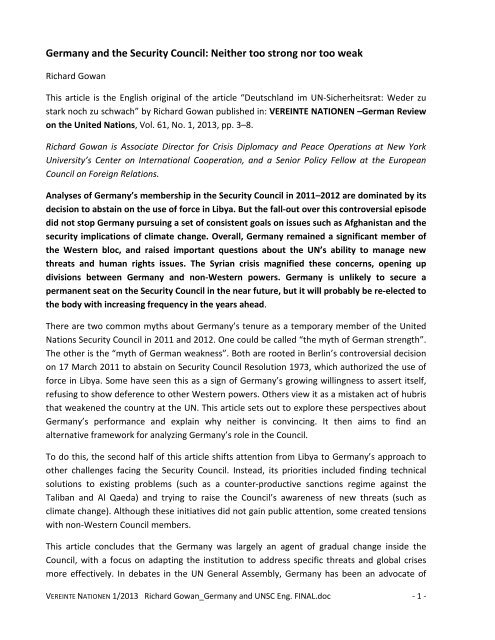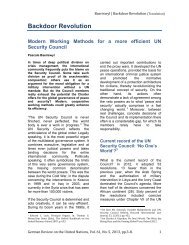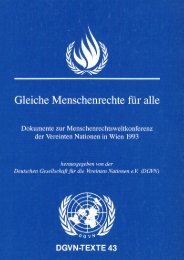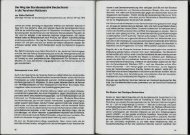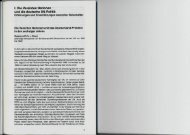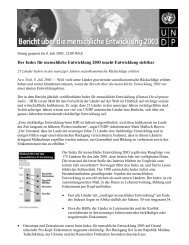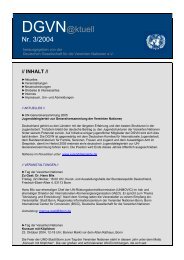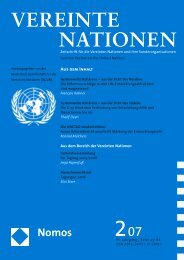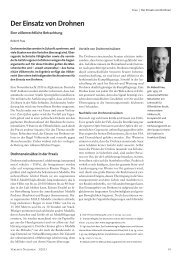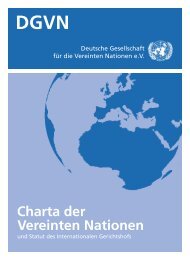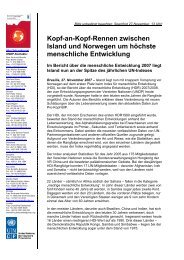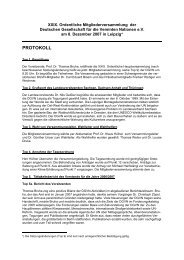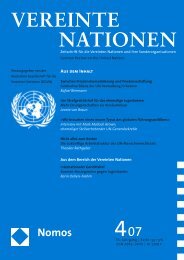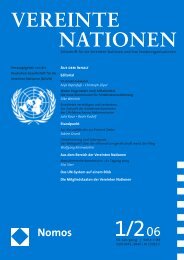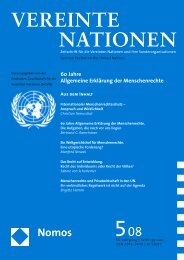Germany and the Security Council: Neither too strong nor too weak
Germany and the Security Council: Neither too strong nor too weak
Germany and the Security Council: Neither too strong nor too weak
You also want an ePaper? Increase the reach of your titles
YUMPU automatically turns print PDFs into web optimized ePapers that Google loves.
<<strong>strong</strong>>Germany</<strong>strong</strong>> <<strong>strong</strong>>and</<strong>strong</strong>> <<strong>strong</strong>>the</<strong>strong</strong>> <<strong>strong</strong>>Security</<strong>strong</strong>> <<strong>strong</strong>>Council</<strong>strong</strong>>: Nei<<strong>strong</strong>>the</<strong>strong</strong>>r <<strong>strong</strong>>too</<strong>strong</strong>> <strong>strong</strong> <strong>nor</strong> <<strong>strong</strong>>too</<strong>strong</strong>> <strong>weak</strong><br />
Richard Gowan<br />
This article is <<strong>strong</strong>>the</<strong>strong</strong>> English original of <<strong>strong</strong>>the</<strong>strong</strong>> article “Deutschl<<strong>strong</strong>>and</<strong>strong</strong>> im UN-Sicherheitsrat: Weder zu<br />
stark noch zu schwach” by Richard Gowan published in: VEREINTE NATIONEN –German Review<br />
on <<strong>strong</strong>>the</<strong>strong</strong>> United Nations, Vol. 61, No. 1, 2013, pp. 3–8.<br />
Richard Gowan is Associate Director for Crisis Diplomacy <<strong>strong</strong>>and</<strong>strong</strong>> Peace Operations at New York<br />
University’s Center on International Cooperation, <<strong>strong</strong>>and</<strong>strong</strong>> a Senior Policy Fellow at <<strong>strong</strong>>the</<strong>strong</strong>> European<br />
<<strong>strong</strong>>Council</<strong>strong</strong>> on Foreign Relations.<br />
Analyses of <<strong>strong</strong>>Germany</<strong>strong</strong>>’s membership in <<strong>strong</strong>>the</<strong>strong</strong>> <<strong>strong</strong>>Security</<strong>strong</strong>> <<strong>strong</strong>>Council</<strong>strong</strong>> in 2011–2012 are dominated by its<br />
decision to abstain on <<strong>strong</strong>>the</<strong>strong</strong>> use of force in Libya. But <<strong>strong</strong>>the</<strong>strong</strong>> fall-out over this controversial episode<br />
did not stop <<strong>strong</strong>>Germany</<strong>strong</strong>> pursuing a set of consistent goals on issues such as Afghanistan <<strong>strong</strong>>and</<strong>strong</strong>> <<strong>strong</strong>>the</<strong>strong</strong>><br />
security implications of climate change. Overall, <<strong>strong</strong>>Germany</<strong>strong</strong>> remained a significant member of<br />
<<strong>strong</strong>>the</<strong>strong</strong>> Western bloc, <<strong>strong</strong>>and</<strong>strong</strong>> raised important questions about <<strong>strong</strong>>the</<strong>strong</strong>> UN’s ability to manage new<br />
threats <<strong>strong</strong>>and</<strong>strong</strong>> human rights issues. The Syrian crisis magnified <<strong>strong</strong>>the</<strong>strong</strong>>se concerns, opening up<br />
divisions between <<strong>strong</strong>>Germany</<strong>strong</strong>> <<strong>strong</strong>>and</<strong>strong</strong>> non-Western powers. <<strong>strong</strong>>Germany</<strong>strong</strong>> is unlikely to secure a<br />
permanent seat on <<strong>strong</strong>>the</<strong>strong</strong>> <<strong>strong</strong>>Security</<strong>strong</strong>> <<strong>strong</strong>>Council</<strong>strong</strong>> in <<strong>strong</strong>>the</<strong>strong</strong>> near future, but it will probably be re-elected to<br />
<<strong>strong</strong>>the</<strong>strong</strong>> body with increasing frequency in <<strong>strong</strong>>the</<strong>strong</strong>> years ahead.<br />
There are two common myths about <<strong>strong</strong>>Germany</<strong>strong</strong>>’s tenure as a temporary member of <<strong>strong</strong>>the</<strong>strong</strong>> United<br />
Nations <<strong>strong</strong>>Security</<strong>strong</strong>> <<strong>strong</strong>>Council</<strong>strong</strong>> in 2011 <<strong>strong</strong>>and</<strong>strong</strong>> 2012. One could be called “<<strong>strong</strong>>the</<strong>strong</strong>> myth of German strength”.<br />
The o<<strong>strong</strong>>the</<strong>strong</strong>>r is <<strong>strong</strong>>the</<strong>strong</strong>> “myth of German <strong>weak</strong>ness”. Both are rooted in Berlin’s controversial decision<br />
on 17 March 2011 to abstain on <<strong>strong</strong>>Security</<strong>strong</strong>> <<strong>strong</strong>>Council</<strong>strong</strong>> Resolution 1973, which authorized <<strong>strong</strong>>the</<strong>strong</strong>> use of<br />
force in Libya. Some have seen this as a sign of <<strong>strong</strong>>Germany</<strong>strong</strong>>’s growing willingness to assert itself,<br />
refusing to show deference to o<<strong>strong</strong>>the</<strong>strong</strong>>r Western powers. O<<strong>strong</strong>>the</<strong>strong</strong>>rs view it as a mistaken act of hubris<br />
that <strong>weak</strong>ened <<strong>strong</strong>>the</<strong>strong</strong>> country at <<strong>strong</strong>>the</<strong>strong</strong>> UN. This article sets out to explore <<strong>strong</strong>>the</<strong>strong</strong>>se perspectives about<br />
<<strong>strong</strong>>Germany</<strong>strong</strong>>’s performance <<strong>strong</strong>>and</<strong>strong</strong>> explain why nei<<strong>strong</strong>>the</<strong>strong</strong>>r is convincing. It <<strong>strong</strong>>the</<strong>strong</strong>>n aims to find an<br />
alternative framework for analyzing <<strong>strong</strong>>Germany</<strong>strong</strong>>’s role in <<strong>strong</strong>>the</<strong>strong</strong>> <<strong>strong</strong>>Council</<strong>strong</strong>>.<br />
To do this, <<strong>strong</strong>>the</<strong>strong</strong>> second half of this article shifts attention from Libya to <<strong>strong</strong>>Germany</<strong>strong</strong>>’s approach to<br />
o<<strong>strong</strong>>the</<strong>strong</strong>>r challenges facing <<strong>strong</strong>>the</<strong>strong</strong>> <<strong>strong</strong>>Security</<strong>strong</strong>> <<strong>strong</strong>>Council</<strong>strong</strong>>. Instead, its priorities included finding technical<br />
solutions to existing problems (such as a counter-productive sanctions regime against <<strong>strong</strong>>the</<strong>strong</strong>><br />
Taliban <<strong>strong</strong>>and</<strong>strong</strong>> Al Qaeda) <<strong>strong</strong>>and</<strong>strong</strong>> trying to raise <<strong>strong</strong>>the</<strong>strong</strong>> <<strong>strong</strong>>Council</<strong>strong</strong>>’s awareness of new threats (such as<br />
climate change). Although <<strong>strong</strong>>the</<strong>strong</strong>>se initiatives did not gain public attention, some created tensions<br />
with non-Western <<strong>strong</strong>>Council</<strong>strong</strong>> members.<br />
This article concludes that <<strong>strong</strong>>the</<strong>strong</strong>> <<strong>strong</strong>>Germany</<strong>strong</strong>> was largely an agent of gradual change inside <<strong>strong</strong>>the</<strong>strong</strong>><br />
<<strong>strong</strong>>Council</<strong>strong</strong>>, with a focus on adapting <<strong>strong</strong>>the</<strong>strong</strong>> institution to address specific threats <<strong>strong</strong>>and</<strong>strong</strong>> global crises<br />
more effectively. In debates in <<strong>strong</strong>>the</<strong>strong</strong>> UN General Assembly, <<strong>strong</strong>>Germany</<strong>strong</strong>> has been an advocate of<br />
VEREINTE NATIONEN 1/2013 Richard Gowan_<<strong>strong</strong>>Germany</<strong>strong</strong>> <<strong>strong</strong>>and</<strong>strong</strong>> UNSC Eng. FINAL.doc - 1 -
more dramatic change to <<strong>strong</strong>>the</<strong>strong</strong>> <<strong>strong</strong>>Council</<strong>strong</strong>> itself, continuing its long-running campaign to win a<br />
permanent seat alongside Brazil, India <<strong>strong</strong>>and</<strong>strong</strong>> Japan. This campaign has made little headway in <<strong>strong</strong>>the</<strong>strong</strong>><br />
last two years. But this has not caused <<strong>strong</strong>>Germany</<strong>strong</strong>> to behave disruptively in <<strong>strong</strong>>Council</<strong>strong</strong>> debates, <<strong>strong</strong>>and</<strong>strong</strong>><br />
it adopted a very different approach to <<strong>strong</strong>>the</<strong>strong</strong>> Syrian crisis – which dominated <<strong>strong</strong>>Council</<strong>strong</strong>> diplomacy<br />
from mid-2011 to mid-2012 – to that followed by Brazil <<strong>strong</strong>>and</<strong>strong</strong>> India.<br />
Overall, <<strong>strong</strong>>the</<strong>strong</strong>> article concludes that <<strong>strong</strong>>Germany</<strong>strong</strong>>’s stint on <<strong>strong</strong>>the</<strong>strong</strong>> <<strong>strong</strong>>Council</<strong>strong</strong>> was largely characterized by<br />
honest <<strong>strong</strong>>and</<strong>strong</strong>> ho<strong>nor</strong>able efforts to make <<strong>strong</strong>>the</<strong>strong</strong>> UN work better. Despite <<strong>strong</strong>>the</<strong>strong</strong>> difficulties over Libya,<br />
<<strong>strong</strong>>Germany</<strong>strong</strong>>’s overall posture has broadly reinforced its ties to Western allies at <<strong>strong</strong>>the</<strong>strong</strong>> UN ra<<strong>strong</strong>>the</<strong>strong</strong>>r than<br />
non-Western powers. It raised questions over <<strong>strong</strong>>the</<strong>strong</strong>> <<strong>strong</strong>>Security</<strong>strong</strong>> <<strong>strong</strong>>Council</<strong>strong</strong>>’s ability to tackle new<br />
threats, like climate change, that are of long-term importance to international security. In doing<br />
so, it was nei<<strong>strong</strong>>the</<strong>strong</strong>>r excessively assertive <strong>nor</strong> excessively meek, <<strong>strong</strong>>and</<strong>strong</strong>> <<strong>strong</strong>>the</<strong>strong</strong>> history of its time in <<strong>strong</strong>>the</<strong>strong</strong>><br />
<<strong>strong</strong>>Council</<strong>strong</strong>> amounts to more than one abstention.<br />
Two myths about <<strong>strong</strong>>Germany</<strong>strong</strong>> <<strong>strong</strong>>and</<strong>strong</strong>> <<strong>strong</strong>>the</<strong>strong</strong>> UN<br />
The Libya abstention<br />
Although this article argues that <<strong>strong</strong>>the</<strong>strong</strong>> legacy of <<strong>strong</strong>>Germany</<strong>strong</strong>>’s abstention on Resolution 1973 has<br />
been overstated, it cannot be ig<strong>nor</strong>ed – in part because it has been misinterpreted so often.<br />
This was a choice made in a period of intense confusion. Forces loyal to Colonel Gaddafi were<br />
pressing towards <<strong>strong</strong>>the</<strong>strong</strong>> rebel city of Benghazi. The U.S. had changed its views on <<strong>strong</strong>>the</<strong>strong</strong>> use of force<br />
almost literally overnight, <<strong>strong</strong>>and</<strong>strong</strong>> Berlin felt ill-informed of its biggest ally’s decision-making. The<br />
European Union remained divided over how to act. The German government’s decision to<br />
abstain – which many German diplomats believed was a miscalculation – was inevitably an ad<br />
hoc judgment call. Had <<strong>strong</strong>>the</<strong>strong</strong>> threat to Benghazi not necessitated a rapid decision, or had US<br />
policy been more consistent, Berlin might have adopted a different position.<br />
While most diplomatic judgment calls are made quickly <<strong>strong</strong>>and</<strong>strong</strong>> on <<strong>strong</strong>>the</<strong>strong</strong>> basis of flawed information,<br />
however, commentators <<strong>strong</strong>>and</<strong>strong</strong>> historian inevitably like to search for deeper meanings behind<br />
each decision. In <<strong>strong</strong>>the</<strong>strong</strong>> case of <<strong>strong</strong>>Germany</<strong>strong</strong>>’s Libyan abstention, two versions of history have<br />
emerged: “<<strong>strong</strong>>the</<strong>strong</strong>> myth of German strength” <<strong>strong</strong>>and</<strong>strong</strong>> its opposite, <<strong>strong</strong>>the</<strong>strong</strong>> “myth of German <strong>weak</strong>ness”.<br />
Nei<<strong>strong</strong>>the</<strong>strong</strong>>r st<<strong>strong</strong>>and</<strong>strong</strong>>s up to scrutiny.<br />
<<strong>strong</strong>>Germany</<strong>strong</strong>>’s ‘strength’<br />
For believers in <<strong>strong</strong>>the</<strong>strong</strong>> “myth of German strength”, <<strong>strong</strong>>the</<strong>strong</strong>> abstention was a demonstration of <<strong>strong</strong>>the</<strong>strong</strong>><br />
country’s increasing confidence on <<strong>strong</strong>>the</<strong>strong</strong>> world stage. Ra<<strong>strong</strong>>the</<strong>strong</strong>>r than follow <<strong>strong</strong>>the</<strong>strong</strong>> US, Britain <<strong>strong</strong>>and</<strong>strong</strong>><br />
France it had voted with Brazil, China, India <<strong>strong</strong>>and</<strong>strong</strong>> Russia, <<strong>strong</strong>>the</<strong>strong</strong>> original BRIC countries (South Africa,<br />
<<strong>strong</strong>>the</<strong>strong</strong>> “Fifth BRIC”, voted with <<strong>strong</strong>>the</<strong>strong</strong>> West against Gaddafi instead). To some commentators, this<br />
looked like an attempt by Berlin to realign itself with rising non-Western economies – or at least<br />
signal its autonomy from o<<strong>strong</strong>>the</<strong>strong</strong>>r Western powers. “The decision provoked speculation that<br />
VEREINTE NATIONEN 1/2013 Richard Gowan_<<strong>strong</strong>>Germany</<strong>strong</strong>> <<strong>strong</strong>>and</<strong>strong</strong>> UNSC Eng. FINAL.doc - 2 -
<<strong>strong</strong>>Germany</<strong>strong</strong>> wanted to shed its supporting role in <<strong>strong</strong>>the</<strong>strong</strong>> U.S.-led Western alliance,” Ian Bremmer <<strong>strong</strong>>and</<strong>strong</strong>><br />
my colleague Mark Leonard have noted, “in favor of <<strong>strong</strong>>the</<strong>strong</strong>> more independent, non-aligned <<strong>strong</strong>>and</<strong>strong</strong>><br />
mercantilist-driven positions taken by leading emerging powers.” 1<br />
Bremmer <<strong>strong</strong>>and</<strong>strong</strong>> Leonard argue that this interpretation has been reinforced by recent disputes<br />
between <<strong>strong</strong>>the</<strong>strong</strong>> US <<strong>strong</strong>>and</<strong>strong</strong>> <<strong>strong</strong>>Germany</<strong>strong</strong>> over economic policy, some of which have become public. In<br />
private, American diplomats admit that <<strong>strong</strong>>the</<strong>strong</strong>>y have had serious tensions with <<strong>strong</strong>>the</<strong>strong</strong>>ir German<br />
counterparts on economic issues. But, almost two years after <<strong>strong</strong>>the</<strong>strong</strong>> fateful vote on Libya,<br />
American <<strong>strong</strong>>and</<strong>strong</strong>> Western European officials based at <<strong>strong</strong>>the</<strong>strong</strong>> UN are broadly appreciative of <<strong>strong</strong>>the</<strong>strong</strong>> role<br />
<<strong>strong</strong>>Germany</<strong>strong</strong>> played at <<strong>strong</strong>>the</<strong>strong</strong>> <<strong>strong</strong>>Security</<strong>strong</strong>> <<strong>strong</strong>>Council</<strong>strong</strong>>. German diplomats moved quickly to undo <<strong>strong</strong>>the</<strong>strong</strong>> damage<br />
over Gaddafi, <<strong>strong</strong>>the</<strong>strong</strong>>y note, <<strong>strong</strong>>and</<strong>strong</strong>> were good team players in <<strong>strong</strong>>the</<strong>strong</strong>> prolonged struggle to manage <<strong>strong</strong>>the</<strong>strong</strong>><br />
Syrian crisis, coordinating closely with o<<strong>strong</strong>>the</<strong>strong</strong>>r members of <<strong>strong</strong>>the</<strong>strong</strong>> EU.<br />
<<strong>strong</strong>>Germany</<strong>strong</strong>>’s ‘<strong>weak</strong>ness’<br />
So it is hard to argue that <<strong>strong</strong>>Germany</<strong>strong</strong>>’s patterns of behavior in <<strong>strong</strong>>the</<strong>strong</strong>> <<strong>strong</strong>>Council</<strong>strong</strong>> suggest a fundamental<br />
realignment of its global view <<strong>strong</strong>>and</<strong>strong</strong>> loyalties, whatever happened elsewhere on economic<br />
matters. Some analysts see this as proof of <<strong>strong</strong>>the</<strong>strong</strong>> “myth of German <strong>weak</strong>ness”. According to this<br />
story, <<strong>strong</strong>>the</<strong>strong</strong>> negative domestic <<strong>strong</strong>>and</<strong>strong</strong>> international reactions to <<strong>strong</strong>>the</<strong>strong</strong>> Libyan abstention showed Berlin<br />
that it had overestimated its power at <<strong>strong</strong>>the</<strong>strong</strong>> UN, forcing it retreat <<strong>strong</strong>>and</<strong>strong</strong>> stick as close as possible<br />
with its traditional Western friends.<br />
This story was summarized by Ralf Neukirch in a brutal article in <<strong>strong</strong>>the</<strong>strong</strong>> German news weekly ‘Der<br />
Spiegel’ in September 2011, which argued that “<<strong>strong</strong>>Germany</<strong>strong</strong>>'s record on <<strong>strong</strong>>the</<strong>strong</strong>> <<strong>strong</strong>>Security</<strong>strong</strong>> <<strong>strong</strong>>Council</<strong>strong</strong>> to<br />
date is worse than even <<strong>strong</strong>>the</<strong>strong</strong>> greatest pessimists had expected.” 2 The Libyan abstention not only<br />
reduced <<strong>strong</strong>>Germany</<strong>strong</strong>>’s ability to act autonomously <<strong>strong</strong>>and</<strong>strong</strong>> innovatively on o<<strong>strong</strong>>the</<strong>strong</strong>>r crises, Neukirch<br />
believed, but also meant that “Berlin's declared goal of becoming a permanent <<strong>strong</strong>>Security</<strong>strong</strong>> <<strong>strong</strong>>Council</<strong>strong</strong>><br />
member has receded far into <<strong>strong</strong>>the</<strong>strong</strong>> distance.” In <<strong>strong</strong>>the</<strong>strong</strong>> final analysis, “its election last year to <<strong>strong</strong>>the</<strong>strong</strong>><br />
council has harmed more than it has benefited <<strong>strong</strong>>Germany</<strong>strong</strong>>.”<br />
It is probably true that <<strong>strong</strong>>Germany</<strong>strong</strong>>’s chances of securing a permanent <<strong>strong</strong>>Security</<strong>strong</strong>> <<strong>strong</strong>>Council</<strong>strong</strong>> seat have<br />
declined over <<strong>strong</strong>>the</<strong>strong</strong>> last two years. In March 2011, very soon after <<strong>strong</strong>>the</<strong>strong</strong>> Libyan vote, Brazil,<br />
<<strong>strong</strong>>Germany</<strong>strong</strong>>, India <<strong>strong</strong>>and</<strong>strong</strong>> Japan launched a drive for a General Assembly resolution supporting <<strong>strong</strong>>the</<strong>strong</strong>>ir<br />
ambitions to be permanent members of <<strong>strong</strong>>the</<strong>strong</strong>> <<strong>strong</strong>>Council</<strong>strong</strong>>. They were able to secure promises of<br />
support from a simple majority of states, but not from <<strong>strong</strong>>the</<strong>strong</strong>> two-thirds of UN membership <<strong>strong</strong>>the</<strong>strong</strong>>y<br />
needed. Diplomatic observers noted that <<strong>strong</strong>>the</<strong>strong</strong>> US had been infuriated by <<strong>strong</strong>>the</<strong>strong</strong>> Brazilian, German<br />
<<strong>strong</strong>>and</<strong>strong</strong>> Indian abstentions over Libya, <<strong>strong</strong>>and</<strong>strong</strong>> Washington’s displeasure certainly did not help <<strong>strong</strong>>the</<strong>strong</strong>>ir<br />
campaign. But <<strong>strong</strong>>the</<strong>strong</strong>> Obama administration had already decided that it was not going to invest in<br />
<<strong>strong</strong>>Security</<strong>strong</strong>> <<strong>strong</strong>>Council</<strong>strong</strong>> reform, <<strong>strong</strong>>and</<strong>strong</strong>> this cannot be attributed solely to Libya.<br />
1<br />
Ian Bremmer <<strong>strong</strong>>and</<strong>strong</strong>> Mark Leonard, “US-German Relationship on <<strong>strong</strong>>the</<strong>strong</strong>> Rocks”, Washington Post, 18 October 2012.<br />
2<br />
Ralf Neukirch, “Shrinking Influence: <<strong>strong</strong>>Germany</<strong>strong</strong>>’s Woeful <<strong>strong</strong>>Security</<strong>strong</strong>> <<strong>strong</strong>>Council</<strong>strong</strong>> Record”, Der Spiegel, 21 September 2011.<br />
VEREINTE NATIONEN 1/2013 Richard Gowan_<<strong>strong</strong>>Germany</<strong>strong</strong>> <<strong>strong</strong>>and</<strong>strong</strong>> UNSC Eng. FINAL.doc - 3 -
More generally, it is difficult to sustain <<strong>strong</strong>>the</<strong>strong</strong>> argument that <<strong>strong</strong>>Germany</<strong>strong</strong>>’s stint on <<strong>strong</strong>>the</<strong>strong</strong>> <<strong>strong</strong>>Security</<strong>strong</strong>><br />
<<strong>strong</strong>>Council</<strong>strong</strong>> has done it irreparable harm. It has restored relations not only with its Western partners<br />
but with Arab countries that it angered by its failure to support war against Gaddafi. In<br />
September 2012, <<strong>strong</strong>>Germany</<strong>strong</strong>> signaled this rapprochement by hosting a high-level <<strong>strong</strong>>Security</<strong>strong</strong>> <<strong>strong</strong>>Council</<strong>strong</strong>><br />
meeting on improving <<strong>strong</strong>>the</<strong>strong</strong>> UN’s ties with <<strong>strong</strong>>the</<strong>strong</strong>> Arab League. And in November 2012 it won a seat<br />
on <<strong>strong</strong>>the</<strong>strong</strong>> UN Human Rights <<strong>strong</strong>>Council</<strong>strong</strong>>, garnering 127 votes from <<strong>strong</strong>>the</<strong>strong</strong>> UN’s 194 member states (<<strong>strong</strong>>the</<strong>strong</strong>> US<br />
was marginally ahead, with 131). This is not <<strong>strong</strong>>the</<strong>strong</strong>> level of support that one would <strong>nor</strong>mally<br />
associate with a country that had lost its diplomatic credibility.<br />
So <<strong>strong</strong>>the</<strong>strong</strong>> bare facts about <<strong>strong</strong>>Germany</<strong>strong</strong>>’s time on <<strong>strong</strong>>the</<strong>strong</strong>> <<strong>strong</strong>>Security</<strong>strong</strong>> <<strong>strong</strong>>Council</<strong>strong</strong>> do not support ei<<strong>strong</strong>>the</<strong>strong</strong>>r “<<strong>strong</strong>>the</<strong>strong</strong>> myth<br />
of strength” or <<strong>strong</strong>>the</<strong>strong</strong>> “myth of <strong>weak</strong>ness”. But is <<strong>strong</strong>>the</<strong>strong</strong>>re a more convincing story to tell about its<br />
tenure?<br />
Priorities: Afghanistan, climate change <<strong>strong</strong>>and</<strong>strong</strong>> children<br />
At <<strong>strong</strong>>the</<strong>strong</strong>> end of <<strong>strong</strong>>Germany</<strong>strong</strong>>’s tenure on <<strong>strong</strong>>the</<strong>strong</strong>> <<strong>strong</strong>>Security</<strong>strong</strong>> <<strong>strong</strong>>Council</<strong>strong</strong>> in 2012, a number of commentators<br />
offered more positive surveys of its role than that set out by Neukirch in 2011. Many<br />
emphasized that <<strong>strong</strong>>the</<strong>strong</strong>> German mission to UN – <<strong>strong</strong>>and</<strong>strong</strong>> in particular Permanent Representative Peter<br />
Wittig – had consolidated a reputation for solid, competent diplomacy. “The most remarkable<br />
feature of <<strong>strong</strong>>Germany</<strong>strong</strong>>’s tenure was its top diplomat, Wittig,” Helmut Volger has argued, describing<br />
<<strong>strong</strong>>the</<strong>strong</strong>> ambassador as “a calm, modest, soft-spoken diplomat who combines dignity <<strong>strong</strong>>and</<strong>strong</strong>><br />
friendliness with toughness in striving for his goal.” 3<br />
In private, non-German diplomats <<strong>strong</strong>>and</<strong>strong</strong>> NGO representatives endorse this view. The German<br />
mission was well-briefed <<strong>strong</strong>>and</<strong>strong</strong>> serious even on those issues, such as conflicts in Africa, in which it<br />
had no particular national interest or leverage. The respect for Wittig, who is widely believed to<br />
have opposed <<strong>strong</strong>>the</<strong>strong</strong>> Libyan abstention, is genuine <<strong>strong</strong>>too</<strong>strong</strong>>. But ultimately competence is nei<<strong>strong</strong>>the</<strong>strong</strong>>r a<br />
political philosophy <strong>nor</strong> a strategic goal. Did <<strong>strong</strong>>Germany</<strong>strong</strong>> demonstrate a broader conception of its<br />
role in <<strong>strong</strong>>the</<strong>strong</strong>> <<strong>strong</strong>>Security</<strong>strong</strong>> <<strong>strong</strong>>Council</<strong>strong</strong>> during its term?<br />
In many ways, <<strong>strong</strong>>Germany</<strong>strong</strong>> followed a consistent set of priorities during its term, many of which<br />
were set out in an article by Ambassador Wittig in this magazine in January 2011. These<br />
included a focus on Afghanistan, climate change <<strong>strong</strong>>and</<strong>strong</strong>> <<strong>strong</strong>>the</<strong>strong</strong>> <<strong>strong</strong>>Security</<strong>strong</strong>> <<strong>strong</strong>>Council</<strong>strong</strong>>’s efforts to protect on<br />
children in armed conflict. Although <<strong>strong</strong>>the</<strong>strong</strong>> Arab uprisings inevitably <<strong>strong</strong>>too</<strong>strong</strong>>k up a good deal of <<strong>strong</strong>>the</<strong>strong</strong>><br />
<<strong>strong</strong>>Security</<strong>strong</strong>> <<strong>strong</strong>>Council</<strong>strong</strong>>’s time, <<strong>strong</strong>>Germany</<strong>strong</strong>> did manage to place emphasis on its pre-existing priorities,<br />
especially during its two months as <<strong>strong</strong>>Security</<strong>strong</strong>> <<strong>strong</strong>>Council</<strong>strong</strong>> president (July 2011 <<strong>strong</strong>>and</<strong>strong</strong>> September 2012).<br />
None of <<strong>strong</strong>>the</<strong>strong</strong>>m proved entirely simple to manage.<br />
Afghanistan<br />
3<br />
Helmut Volger, “<<strong>strong</strong>>Germany</<strong>strong</strong>>’s ‘Added Value’ to <<strong>strong</strong>>the</<strong>strong</strong>> <<strong>strong</strong>>Security</<strong>strong</strong>> <<strong>strong</strong>>Council</<strong>strong</strong>>”, PassBlue, 27 December 2012.<br />
VEREINTE NATIONEN 1/2013 Richard Gowan_<<strong>strong</strong>>Germany</<strong>strong</strong>> <<strong>strong</strong>>and</<strong>strong</strong>> UNSC Eng. FINAL.doc - 4 -
Of all <<strong>strong</strong>>the</<strong>strong</strong>> issues on <<strong>strong</strong>>Germany</<strong>strong</strong>>’s agenda, <<strong>strong</strong>>the</<strong>strong</strong>> situation in Afghanistan was of <<strong>strong</strong>>the</<strong>strong</strong>> greatest<br />
immediate interest to Berlin. By early 2011, it was clear that <<strong>strong</strong>>the</<strong>strong</strong>> NATO-led operation in<br />
Afghanistan was approaching its final phase, but <<strong>strong</strong>>the</<strong>strong</strong>>re was deep uncertainty about <<strong>strong</strong>>the</<strong>strong</strong>><br />
country’s future stability. Although <<strong>strong</strong>>the</<strong>strong</strong>> UN has been heavily involved in efforts to reconstruct<br />
Afghanistan after <<strong>strong</strong>>the</<strong>strong</strong>> initial fall of <<strong>strong</strong>>the</<strong>strong</strong>> Taliban it had been increasingly marginalized as <<strong>strong</strong>>the</<strong>strong</strong>> war<br />
wore on. The UN Assistance Mission in Afghanistan (UNAMA) was stuck in an uncomfortable<br />
political partnership with <<strong>strong</strong>>the</<strong>strong</strong>> Afghan government. The <<strong>strong</strong>>Security</<strong>strong</strong>> <<strong>strong</strong>>Council</<strong>strong</strong>>’s Al Qaeda/Taliban<br />
sanctions committee oversaw a single list of sanctions against over 400 persons <<strong>strong</strong>>and</<strong>strong</strong>> entities.<br />
But analysts saw <<strong>strong</strong>>the</<strong>strong</strong>> existence of a single sanctions regime covering both Al Qaeda <<strong>strong</strong>>and</<strong>strong</strong>> <<strong>strong</strong>>the</<strong>strong</strong>><br />
Taliban as an obstacle to starting talks on a political settlement with <<strong>strong</strong>>the</<strong>strong</strong>> latter, as it effectively<br />
br<<strong>strong</strong>>and</<strong>strong</strong>>ed all Taliban as terrorists. The list of sanctioned individuals did not accurately reflect <<strong>strong</strong>>the</<strong>strong</strong>><br />
insurgents’ comm<<strong>strong</strong>>and</<strong>strong</strong>> structure <<strong>strong</strong>>and</<strong>strong</strong>> included around thirty individuals who were believed to be<br />
dead.<br />
While <<strong>strong</strong>>the</<strong>strong</strong>> US was increasingly in <<strong>strong</strong>>the</<strong>strong</strong>> lead in military operations in Afghanistan, <<strong>strong</strong>>Germany</<strong>strong</strong>> <<strong>strong</strong>>too</<strong>strong</strong>>k<br />
responsibility for efforts to fix <<strong>strong</strong>>the</<strong>strong</strong>> UN’s flawed engagement with <<strong>strong</strong>>the</<strong>strong</strong>> country. <<strong>strong</strong>>Germany</<strong>strong</strong>> “held<br />
<<strong>strong</strong>>the</<strong>strong</strong>> pen” in <<strong>strong</strong>>the</<strong>strong</strong>> drafting of resolutions concerning Afghanistan, an unusual privilege for a nonpermanent<br />
member of <<strong>strong</strong>>the</<strong>strong</strong>> <<strong>strong</strong>>Security</<strong>strong</strong>> <<strong>strong</strong>>Council</<strong>strong</strong>>. In this capacity, it orchestrated <<strong>strong</strong>>the</<strong>strong</strong>> division of <<strong>strong</strong>>the</<strong>strong</strong>><br />
Taliban <<strong>strong</strong>>and</<strong>strong</strong>> Al Qaeda sanctions regimes in mid-2011 to ease potential contacts with <<strong>strong</strong>>the</<strong>strong</strong>> Taliban.<br />
<<strong>strong</strong>>Germany</<strong>strong</strong>> also initiated a major review of UNAMA. These steps improved <<strong>strong</strong>>the</<strong>strong</strong>> framework for<br />
managing NATO’s (<<strong>strong</strong>>and</<strong>strong</strong>> <<strong>strong</strong>>Germany</<strong>strong</strong>>’s) exit from Afghanistan, as did <<strong>strong</strong>>the</<strong>strong</strong>> December 2011 Bonn<br />
conference on <<strong>strong</strong>>the</<strong>strong</strong>> country’s future. The Taliban sanctions committee – chaired by <<strong>strong</strong>>Germany</<strong>strong</strong>> –<br />
moved rapidly to revise its list of targeted individuals.<br />
But many problems remain unresolved: UN officials reported in 2012 that <<strong>strong</strong>>the</<strong>strong</strong>> Taliban sanctions<br />
list still omitted a number of senior insurgents. While <<strong>strong</strong>>Germany</<strong>strong</strong>> also <<strong>strong</strong>>too</<strong>strong</strong>>k steps to improve<br />
human rights safeguards for <<strong>strong</strong>>the</<strong>strong</strong>> st<<strong>strong</strong>>and</<strong>strong</strong>>-alone Al Qaeda sanctions list, <<strong>strong</strong>>the</<strong>strong</strong>> UN’s special rapporteur<br />
on counter-terrorism has argued that <<strong>strong</strong>>the</<strong>strong</strong>>se are still not <strong>strong</strong> enough. UNAMA, which has<br />
faced vicious attacks on its personnel, is set to undergo budget cuts in 2013 <<strong>strong</strong>>and</<strong>strong</strong>> it still unclear<br />
exactly what role <<strong>strong</strong>>the</<strong>strong</strong>> UN can play in Afghanistan once NATO takes leave. Progress towards<br />
serious talks with <<strong>strong</strong>>the</<strong>strong</strong>> Taliban has been halting.<br />
Climate change <<strong>strong</strong>>and</<strong>strong</strong>> security<br />
<<strong>strong</strong>>Germany</<strong>strong</strong>> can, none<<strong>strong</strong>>the</<strong>strong</strong>>less, take some credit for improvements to <<strong>strong</strong>>the</<strong>strong</strong>> UN’s engagement with<br />
Afghan problems. Its decision to hold a <<strong>strong</strong>>Security</<strong>strong</strong>> <<strong>strong</strong>>Council</<strong>strong</strong>> debate on <<strong>strong</strong>>the</<strong>strong</strong>> security implications of<br />
climate change during its presidency in July 2011 produced fewer concrete results. The UK had<br />
organized one previous debate on <<strong>strong</strong>>the</<strong>strong</strong>> topic in 2007, creating a great deal of controversy over<br />
whe<<strong>strong</strong>>the</<strong>strong</strong>>r it should be on <<strong>strong</strong>>the</<strong>strong</strong>> agenda at all. The British had avoided returning to <<strong>strong</strong>>the</<strong>strong</strong>> matter.<br />
<<strong>strong</strong>>Germany</<strong>strong</strong>>’s initiative to raise <<strong>strong</strong>>the</<strong>strong</strong>> issue reflected frustration with <<strong>strong</strong>>the</<strong>strong</strong>> failure of o<<strong>strong</strong>>the</<strong>strong</strong>>r diplomatic<br />
VEREINTE NATIONEN 1/2013 Richard Gowan_<<strong>strong</strong>>Germany</<strong>strong</strong>> <<strong>strong</strong>>and</<strong>strong</strong>> UNSC Eng. FINAL.doc - 5 -
mechanisms to manage global warming. At <<strong>strong</strong>>the</<strong>strong</strong>> time of <<strong>strong</strong>>the</<strong>strong</strong>> debate, <<strong>strong</strong>>the</<strong>strong</strong>> debacle of <<strong>strong</strong>>the</<strong>strong</strong>><br />
Copenhagen summit in 2009 was still a very recent memory.<br />
The German debate also came close to failure, although <<strong>strong</strong>>the</<strong>strong</strong>> goal was to agree a presidential<br />
statement on <<strong>strong</strong>>the</<strong>strong</strong>>se challenges, a fairly modest ambition. <<strong>strong</strong>>Germany</<strong>strong</strong>> was aware that China <<strong>strong</strong>>and</<strong>strong</strong>><br />
Russia in particular were opposed to having <<strong>strong</strong>>the</<strong>strong</strong>> issue on <<strong>strong</strong>>the</<strong>strong</strong>> agenda at all, <<strong>strong</strong>>and</<strong>strong</strong>> that many<br />
developing countries were also suspicious of <<strong>strong</strong>>the</<strong>strong</strong>> “securitization” of climate issues. The German<br />
mission produced a very carefully worded concept note that emphasized that <<strong>strong</strong>>the</<strong>strong</strong>> debate would<br />
focus “exclusively” on security issues, highlighting sea-level rise (threatening <<strong>strong</strong>>the</<strong>strong</strong>> “very survival”<br />
of small isl<<strong>strong</strong>>and</<strong>strong</strong>> countries) <<strong>strong</strong>>and</<strong>strong</strong>> food security.<br />
This deliberately narrow focus did not placate China in particular, <<strong>strong</strong>>and</<strong>strong</strong>> for a time it appeared<br />
that it would be impossible to agree a statement. US ambassador to <<strong>strong</strong>>the</<strong>strong</strong>> UN Susan Rice<br />
reportedly told her counterparts that <<strong>strong</strong>>the</<strong>strong</strong>>y were being “pa<<strong>strong</strong>>the</<strong>strong</strong>>tic”. Eventually a compromise<br />
statement was worked out, although <<strong>strong</strong>>the</<strong>strong</strong>> majority of this was devoted to reaffirming <<strong>strong</strong>>the</<strong>strong</strong>><br />
primacy of o<<strong>strong</strong>>the</<strong>strong</strong>>r UN entities - notably <<strong>strong</strong>>the</<strong>strong</strong>> strained talks under <<strong>strong</strong>>the</<strong>strong</strong>> UN Framework Convention<br />
on Climate Change (UNFCCC) – on <<strong>strong</strong>>the</<strong>strong</strong>> issue. It sole actionable element was to direct <<strong>strong</strong>>the</<strong>strong</strong>> UN<br />
Secretary-General to ensure that climate-related drivers of conflict should be included in his<br />
reports to <<strong>strong</strong>>the</<strong>strong</strong>> <<strong>strong</strong>>Council</<strong>strong</strong>>. This has only been implemented patchily so far.<br />
Children <<strong>strong</strong>>and</<strong>strong</strong>> armed conflict<br />
Having tussled with China <<strong>strong</strong>>and</<strong>strong</strong>> o<<strong>strong</strong>>the</<strong>strong</strong>>r developing economies over climate change in 2011,<br />
<<strong>strong</strong>>Germany</<strong>strong</strong>> invited fur<<strong>strong</strong>>the</<strong>strong</strong>>r controversy over <<strong>strong</strong>>the</<strong>strong</strong>> issue of children in armed conflict in 2012.<br />
<<strong>strong</strong>>Germany</<strong>strong</strong>> <<strong>strong</strong>>too</<strong>strong</strong>>k over chairing <<strong>strong</strong>>the</<strong>strong</strong>> <<strong>strong</strong>>Council</<strong>strong</strong>> working group on <<strong>strong</strong>>the</<strong>strong</strong>> issue in 2011, <<strong>strong</strong>>and</<strong>strong</strong>> was credited<br />
with streamlining its work.<br />
But tensions arose in September 2012, during <<strong>strong</strong>>Germany</<strong>strong</strong>>’s second <<strong>strong</strong>>Council</<strong>strong</strong>> presidency, after <<strong>strong</strong>>the</<strong>strong</strong>><br />
Secretary-General tabled a report that addressed <<strong>strong</strong>>the</<strong>strong</strong>> situation of children not only in countries<br />
on <<strong>strong</strong>>the</<strong>strong</strong>> <<strong>strong</strong>>Council</<strong>strong</strong>>’s agenda but a number of o<<strong>strong</strong>>the</<strong>strong</strong>>rs including Colombia, Pakistan <<strong>strong</strong>>and</<strong>strong</strong>> India. All three<br />
states sat on <<strong>strong</strong>>the</<strong>strong</strong>> <<strong>strong</strong>>Council</<strong>strong</strong>>, <<strong>strong</strong>>and</<strong>strong</strong>> all were displeased. <<strong>strong</strong>>Germany</<strong>strong</strong>> introduced a resolution – much of it<br />
based on previously-agreed texts – underlining <<strong>strong</strong>>the</<strong>strong</strong>> use of sanctions against violators of <<strong>strong</strong>>the</<strong>strong</strong>><br />
rights of children. China <<strong>strong</strong>>and</<strong>strong</strong>> Russia abstained on this, as did Azerbaijan <<strong>strong</strong>>and</<strong>strong</strong>> Pakistan, <<strong>strong</strong>>and</<strong>strong</strong>><br />
Colombia <<strong>strong</strong>>and</<strong>strong</strong>> India expressed reservations.<br />
Interpreting <<strong>strong</strong>>Germany</<strong>strong</strong>>’s priorities<br />
What does <<strong>strong</strong>>Germany</<strong>strong</strong>>’s pursuit of <<strong>strong</strong>>the</<strong>strong</strong>>se three overarching priorities tell us? Three points st<<strong>strong</strong>>and</<strong>strong</strong>><br />
out. The first is that, at least according to non-Western critics, Berlin had set a very Western<br />
agenda. Taking steps to improve UN engagement in Afghanistan clearly fitted in with <<strong>strong</strong>>Germany</<strong>strong</strong>>’s<br />
concerns as a NATO member. Its decision to raise climate change in <<strong>strong</strong>>the</<strong>strong</strong>> <<strong>strong</strong>>Security</<strong>strong</strong>> <<strong>strong</strong>>Council</<strong>strong</strong>> raised<br />
concerns among developing countries, which have often clashed with <<strong>strong</strong>>the</<strong>strong</strong>> EU in UNFCCC<br />
VEREINTE NATIONEN 1/2013 Richard Gowan_<<strong>strong</strong>>Germany</<strong>strong</strong>> <<strong>strong</strong>>and</<strong>strong</strong>> UNSC Eng. FINAL.doc - 6 -
debates (<<strong>strong</strong>>the</<strong>strong</strong>> exceptions were small isl<<strong>strong</strong>>and</<strong>strong</strong>> states concerned about sea-level rise). And its<br />
emphasis on children in armed conflict looked like part of a Western human rights agenda that<br />
countries like Pakistan <<strong>strong</strong>>and</<strong>strong</strong>> Colombia claimed failed to reflect <<strong>strong</strong>>the</<strong>strong</strong>> realities of <<strong>strong</strong>>the</<strong>strong</strong>>ir security<br />
problems. During <<strong>strong</strong>>the</<strong>strong</strong>> debate on children, China’s ambassador argued that <<strong>strong</strong>>the</<strong>strong</strong>> <<strong>strong</strong>>Security</<strong>strong</strong>> <<strong>strong</strong>>Council</<strong>strong</strong>><br />
was just creating “difficulties <<strong>strong</strong>>and</<strong>strong</strong>> problems” for Pakistan in its fight against terrorism.<br />
Returning <<strong>strong</strong>>the</<strong>strong</strong>> “myth of German <strong>weak</strong>ness” outlined above, it should be noted that <<strong>strong</strong>>Germany</<strong>strong</strong>> did<br />
not pursue any of <<strong>strong</strong>>the</<strong>strong</strong>>se initiatives solely to rebuild its credibility in <<strong>strong</strong>>the</<strong>strong</strong>> West after <<strong>strong</strong>>the</<strong>strong</strong>> Libya<br />
episode. They were all on <<strong>strong</strong>>Germany</<strong>strong</strong>>’s agenda when it joined <<strong>strong</strong>>the</<strong>strong</strong>> <<strong>strong</strong>>Security</<strong>strong</strong>> <<strong>strong</strong>>Council</<strong>strong</strong>> in 2011. If<br />
Benghazi had not reshaped perceptions of Berlin’s diplomacy, pundits might be talking about its<br />
ultra-Western priorities at <<strong>strong</strong>>the</<strong>strong</strong>> UN.<br />
This leads us to a second striking point about <<strong>strong</strong>>Germany</<strong>strong</strong>>’s approach to life on <<strong>strong</strong>>the</<strong>strong</strong>> <<strong>strong</strong>>Security</<strong>strong</strong>><br />
<<strong>strong</strong>>Council</<strong>strong</strong>>: it was quite prepared to pick fights on with rising powers <<strong>strong</strong>>and</<strong>strong</strong>> China in particular. In<br />
o<<strong>strong</strong>>the</<strong>strong</strong>>r international forums, such as <<strong>strong</strong>>the</<strong>strong</strong>> G20, <<strong>strong</strong>>Germany</<strong>strong</strong>> has made efforts to build close<br />
relationships with <<strong>strong</strong>>the</<strong>strong</strong>> Chinese. But in pursuing a broadly Western agenda at <<strong>strong</strong>>the</<strong>strong</strong>> UN it has<br />
accepted predictable clashes with Beijing. It is arguable that <<strong>strong</strong>>the</<strong>strong</strong>>se clashes do not matter that<br />
much to ei<<strong>strong</strong>>the</<strong>strong</strong>>r Beijing or Berlin. The economic issues discussed at <<strong>strong</strong>>the</<strong>strong</strong>> G20 are of central<br />
national importance to both. Thematic statements of principle from <<strong>strong</strong>>the</<strong>strong</strong>> <<strong>strong</strong>>Security</<strong>strong</strong>> <<strong>strong</strong>>Council</<strong>strong</strong>> are<br />
not. None<<strong>strong</strong>>the</<strong>strong</strong>>less, most of <<strong>strong</strong>>the</<strong>strong</strong>> evidence from <<strong>strong</strong>>Germany</<strong>strong</strong>>’s time on <<strong>strong</strong>>the</<strong>strong</strong>> <<strong>strong</strong>>Council</<strong>strong</strong>> suggests that it is<br />
not attempting to realign its stance at <<strong>strong</strong>>the</<strong>strong</strong>> UN to curry favor with non-Western powers.<br />
What, <<strong>strong</strong>>the</<strong>strong</strong>>n, was <<strong>strong</strong>>Germany</<strong>strong</strong>> trying to achieve? In <<strong>strong</strong>>the</<strong>strong</strong>> Afghan case, it was following clear national<br />
interests. In raising climate change <<strong>strong</strong>>and</<strong>strong</strong>> children in armed conflict, however, it appeared to be<br />
pushing (albeit very gently) at <<strong>strong</strong>>the</<strong>strong</strong>> boundaries of <<strong>strong</strong>>the</<strong>strong</strong>> <<strong>strong</strong>>Council</<strong>strong</strong>>’s conception of peace <<strong>strong</strong>>and</<strong>strong</strong>> security.<br />
By emphasizing <<strong>strong</strong>>the</<strong>strong</strong>> issue of children’s rights, <<strong>strong</strong>>Germany</<strong>strong</strong>> <<strong>strong</strong>>too</<strong>strong</strong>>k a small step to embed core human<br />
rights principles in <<strong>strong</strong>>the</<strong>strong</strong>> <<strong>strong</strong>>Security</<strong>strong</strong>> <<strong>strong</strong>>Council</<strong>strong</strong>>’s work. In raising climate change, it tried to initiate a<br />
broader debate about <<strong>strong</strong>>the</<strong>strong</strong>> shifting threats to international security, even if <<strong>strong</strong>>the</<strong>strong</strong>> resulting<br />
statement from <<strong>strong</strong>>Council</<strong>strong</strong>> was predictably tepid.<br />
As I argued at <<strong>strong</strong>>the</<strong>strong</strong>> outset, all <<strong>strong</strong>>the</<strong>strong</strong>>se efforts were contributions to making <<strong>strong</strong>>the</<strong>strong</strong>> <<strong>strong</strong>>Security</<strong>strong</strong>> <<strong>strong</strong>>Council</<strong>strong</strong>><br />
adapt to new security challenges. A great deal has been written about <<strong>strong</strong>>the</<strong>strong</strong>> need for <<strong>strong</strong>>the</<strong>strong</strong>> <<strong>strong</strong>>Council</<strong>strong</strong>><br />
to take non-traditional threats <<strong>strong</strong>>and</<strong>strong</strong>> human rights more seriously, but diplomatic progress<br />
towards this goal is typically a matter of slow procedural steps. The German initiatives outlined<br />
above fall into this category. But <<strong>strong</strong>>the</<strong>strong</strong>>re are moments when <<strong>strong</strong>>the</<strong>strong</strong>> <<strong>strong</strong>>Council</<strong>strong</strong>> has to address <<strong>strong</strong>>the</<strong>strong</strong>><br />
meaning of international security much more urgently. The Arab Spring has sparked a fierce<br />
debate over <<strong>strong</strong>>the</<strong>strong</strong>>se issues. While <<strong>strong</strong>>Germany</<strong>strong</strong>> fumbled its response to <<strong>strong</strong>>the</<strong>strong</strong>> Libyan uprising, it broader<br />
response to <<strong>strong</strong>>the</<strong>strong</strong>> Arab Spring underlined its awareness of <<strong>strong</strong>>the</<strong>strong</strong>> need for <<strong>strong</strong>>the</<strong>strong</strong>> UN to adapt to new<br />
challenges – although China <<strong>strong</strong>>and</<strong>strong</strong>> Russia have refused to accept this.<br />
The Arab Spring<br />
VEREINTE NATIONEN 1/2013 Richard Gowan_<<strong>strong</strong>>Germany</<strong>strong</strong>> <<strong>strong</strong>>and</<strong>strong</strong>> UNSC Eng. FINAL.doc - 7 -
<<strong>strong</strong>>Germany</<strong>strong</strong>> recognized early on that <<strong>strong</strong>>the</<strong>strong</strong>> Arab Spring could up-end many existing assumptions<br />
about <<strong>strong</strong>>the</<strong>strong</strong>> <<strong>strong</strong>>Security</<strong>strong</strong>> <<strong>strong</strong>>Council</<strong>strong</strong>>'s priorities <<strong>strong</strong>>and</<strong>strong</strong>> responsibilities. In February 2011, while Egypt was in<br />
turmoil, Brazil convened a ministerial <<strong>strong</strong>>Security</<strong>strong</strong>> <<strong>strong</strong>>Council</<strong>strong</strong>> meeting on <<strong>strong</strong>>the</<strong>strong</strong>> links between<br />
development <<strong>strong</strong>>and</<strong>strong</strong>> security. The event was briefly notorious when it was reported that <<strong>strong</strong>>the</<strong>strong</strong>> Indian<br />
foreign minister has managed to read a large part of his Portuguese counterpart’s speech by<br />
mistake. But German foreign minister Guido Westerwelle tried to <<strong>strong</strong>>the</<strong>strong</strong>> use <<strong>strong</strong>>the</<strong>strong</strong>> occasion to<br />
address <<strong>strong</strong>>the</<strong>strong</strong>> events in <<strong>strong</strong>>the</<strong>strong</strong>> Arab <<strong>strong</strong>>and</<strong>strong</strong>> promise support for a democratic transition in Egypt.<br />
At that moment, it was not yet clear that <<strong>strong</strong>>the</<strong>strong</strong>> UN would have a significant role in <<strong>strong</strong>>the</<strong>strong</strong>> Arab<br />
awakening. Nor could anyone predict that Westerwelle would sustain major political damage<br />
due to his advocacy of <<strong>strong</strong>>the</<strong>strong</strong>> Libyan abstention <<strong>strong</strong>>the</<strong>strong</strong>> following month. But German officials argue<br />
that <<strong>strong</strong>>the</<strong>strong</strong>> foreign minister’s intervention foreshadowed <<strong>strong</strong>>the</<strong>strong</strong>> <<strong>strong</strong>>Security</<strong>strong</strong>> <<strong>strong</strong>>Council</<strong>strong</strong>>’s involvement in<br />
attempting to guide Libya, Yemen <<strong>strong</strong>>and</<strong>strong</strong>> Syria towards peaceful political change through 2011 <<strong>strong</strong>>and</<strong>strong</strong>><br />
2012. <<strong>strong</strong>>Germany</<strong>strong</strong>> fully supported efforts to deal with <<strong>strong</strong>>the</<strong>strong</strong>> Gaddafi regime though non-military<br />
means including sanctions <<strong>strong</strong>>and</<strong>strong</strong>> <<strong>strong</strong>>the</<strong>strong</strong>> invocation of <<strong>strong</strong>>the</<strong>strong</strong>> International Criminal Court, m<<strong>strong</strong>>and</<strong>strong</strong>>ated by<br />
<<strong>strong</strong>>Security</<strong>strong</strong>> <<strong>strong</strong>>Council</<strong>strong</strong>> resolution 1970 in late February 2011.<br />
Although <<strong>strong</strong>>the</<strong>strong</strong>> ensuing debate over Resolution 1973 raised questions about <<strong>strong</strong>>Germany</<strong>strong</strong>>’s attitude<br />
to <<strong>strong</strong>>the</<strong>strong</strong>> Arab Spring, it later emerged as a <strong>strong</strong> advocate of a peaceful transition in Syria –<br />
working closely with France <<strong>strong</strong>>and</<strong>strong</strong>> <<strong>strong</strong>>the</<strong>strong</strong>> UK – <<strong>strong</strong>>and</<strong>strong</strong>> made a particular point of dem<<strong>strong</strong>>and</<strong>strong</strong>>ing that <<strong>strong</strong>>the</<strong>strong</strong>><br />
regime in Damascus should be held accountable for crimes against <<strong>strong</strong>>the</<strong>strong</strong>> population. <<strong>strong</strong>>Germany</<strong>strong</strong>><br />
joined France <<strong>strong</strong>>and</<strong>strong</strong>> Britain in calling for action against Syria at <<strong>strong</strong>>the</<strong>strong</strong>> <<strong>strong</strong>>Security</<strong>strong</strong>> <<strong>strong</strong>>Council</<strong>strong</strong>> from mid-<br />
2011, despite American doubts about <<strong>strong</strong>>the</<strong>strong</strong>> value of an open confrontation with Russia <<strong>strong</strong>>and</<strong>strong</strong>> China.<br />
French <<strong>strong</strong>>and</<strong>strong</strong>> British diplomats say that <<strong>strong</strong>>the</<strong>strong</strong>>y treated <<strong>strong</strong>>the</<strong>strong</strong>>ir German counterparts as equals in<br />
discussions over Syria, even if <<strong>strong</strong>>the</<strong>strong</strong>>y enjoyed additional leverage as permanent members of <<strong>strong</strong>>the</<strong>strong</strong>><br />
<<strong>strong</strong>>Council</<strong>strong</strong>>. This was not absolutely consistent (<<strong>strong</strong>>Germany</<strong>strong</strong>> was not represented, for example, at<br />
ministerial talks in Geneva on <<strong>strong</strong>>the</<strong>strong</strong>> crisis in mid-2012) but <<strong>strong</strong>>the</<strong>strong</strong>> European powers generally<br />
maintained a united front. At no point did <<strong>strong</strong>>the</<strong>strong</strong>> increasingly rancorous debates within <<strong>strong</strong>>the</<strong>strong</strong>> EU<br />
over <<strong>strong</strong>>the</<strong>strong</strong>> Eurozone impact on <<strong>strong</strong>>the</<strong>strong</strong>>ir cooperation on Syria. 4<br />
German officials initially hoped that <<strong>strong</strong>>the</<strong>strong</strong>>ir abstention over Libya might give <<strong>strong</strong>>the</<strong>strong</strong>>m additional<br />
credibility over Syria in dealings with Brazil, China, India <<strong>strong</strong>>and</<strong>strong</strong>> Russia. They were disappointed, as<br />
<<strong>strong</strong>>the</<strong>strong</strong>> big non-Western powers increasingly coordinated among <<strong>strong</strong>>the</<strong>strong</strong>>mselves to prevent any serious<br />
action against Syria in 2011. Although India switched position in early 2012, this appears to<br />
largely a response to pressure from Saudi Arabia <<strong>strong</strong>>and</<strong>strong</strong>> o<<strong>strong</strong>>the</<strong>strong</strong>>r Arab countries opposed to <<strong>strong</strong>>the</<strong>strong</strong>><br />
Syrian regime ra<<strong>strong</strong>>the</<strong>strong</strong>>r than European diplomatic efforts. 5 Here we see a similar pattern to that<br />
we observed over climate change <<strong>strong</strong>>and</<strong>strong</strong>> children in armed conflict: ra<<strong>strong</strong>>the</<strong>strong</strong>>r than finding<br />
4<br />
<<strong>strong</strong>>Germany</<strong>strong</strong>>’s abstention on Palestine’s bid for recognition as a state in <<strong>strong</strong>>the</<strong>strong</strong>> UN General Assembly in 2012 was fur<<strong>strong</strong>>the</<strong>strong</strong>>r<br />
evidence that Berlin is slowly moving closer to <<strong>strong</strong>>the</<strong>strong</strong>> EU mainstream on Middle East issues.<br />
5<br />
Brazil, which appeared more sympa<<strong>strong</strong>>the</<strong>strong</strong>>tic to Western positions than India on Syria in 2011, left <<strong>strong</strong>>the</<strong>strong</strong>> <<strong>strong</strong>>Security</<strong>strong</strong>><br />
<<strong>strong</strong>>Council</<strong>strong</strong>> at <<strong>strong</strong>>the</<strong>strong</strong>> end of that year.<br />
VEREINTE NATIONEN 1/2013 Richard Gowan_<<strong>strong</strong>>Germany</<strong>strong</strong>> <<strong>strong</strong>>and</<strong>strong</strong>> UNSC Eng. FINAL.doc - 8 -
opportunities to align itself with <<strong>strong</strong>>the</<strong>strong</strong>> BRICS countries, as over Libya, <<strong>strong</strong>>Germany</<strong>strong</strong>> has taken positions<br />
<<strong>strong</strong>>and</<strong>strong</strong>> raised issues that streng<<strong>strong</strong>>the</<strong>strong</strong>>n its ties with Western friends at <<strong>strong</strong>>the</<strong>strong</strong>> UN.<br />
This has not harmed its relations with all non-Western governments: Berlin’s position on Syria<br />
was welcomed by Arab governments <<strong>strong</strong>>and</<strong>strong</strong>> supported by a majority of all nations in <<strong>strong</strong>>the</<strong>strong</strong>> General<br />
Assembly. None<<strong>strong</strong>>the</<strong>strong</strong>>less, in a period in which <<strong>strong</strong>>the</<strong>strong</strong>>re is a risk of deepening tensions between<br />
Western powers <<strong>strong</strong>>and</<strong>strong</strong>> <<strong>strong</strong>>the</<strong>strong</strong>> BRICS at <<strong>strong</strong>>the</<strong>strong</strong>> UN, <<strong>strong</strong>>Germany</<strong>strong</strong>>’s behavior over Syria again reaffirmed its<br />
basic commitment to <<strong>strong</strong>>the</<strong>strong</strong>> West.<br />
Conclusion<br />
By <<strong>strong</strong>>Germany</<strong>strong</strong>>’s last day on <<strong>strong</strong>>the</<strong>strong</strong>> <<strong>strong</strong>>Security</<strong>strong</strong>> <<strong>strong</strong>>Council</<strong>strong</strong>> on 31 December 2012, it had arguably dispelled<br />
<<strong>strong</strong>>the</<strong>strong</strong>> myths that had grown up around its tenure. It had not followed a strategy of deliberate<br />
alignment with big non-Western powers. It had demonstrated its enduring influence at <<strong>strong</strong>>the</<strong>strong</strong>> UN<br />
with success in its campaign for a seat on <<strong>strong</strong>>the</<strong>strong</strong>> Human Rights <<strong>strong</strong>>Council</<strong>strong</strong>>. And it had shown itself<br />
willing to risk controversy with o<<strong>strong</strong>>the</<strong>strong</strong>>r major powers by raising contentious topics in <<strong>strong</strong>>the</<strong>strong</strong>> <<strong>strong</strong>>Security</<strong>strong</strong>><br />
<<strong>strong</strong>>Council</<strong>strong</strong>>. In raising <<strong>strong</strong>>the</<strong>strong</strong>>se topics it had also demonstrated a consistent belief in <<strong>strong</strong>>the</<strong>strong</strong>> need to<br />
improve <<strong>strong</strong>>the</<strong>strong</strong>> UN’s performance through gradual change, whe<<strong>strong</strong>>the</<strong>strong</strong>>r in dealing with specific<br />
problems like Afghanistan or gr<<strong>strong</strong>>and</<strong>strong</strong>> strategic issues like climate change.<br />
This was certainly a more impressive performance than most temporary members of <<strong>strong</strong>>the</<strong>strong</strong>><br />
<<strong>strong</strong>>Security</<strong>strong</strong>> <<strong>strong</strong>>Council</<strong>strong</strong>>. It is unlikely to hasten <<strong>strong</strong>>Germany</<strong>strong</strong>>’s progress towards a permanent seat on <<strong>strong</strong>>the</<strong>strong</strong>><br />
<<strong>strong</strong>>Council</<strong>strong</strong>>. After <<strong>strong</strong>>the</<strong>strong</strong>> failure of <<strong>strong</strong>>the</<strong>strong</strong>>ir 2011 drive for a General Assembly resolution on <<strong>strong</strong>>Council</<strong>strong</strong>><br />
reform, Brazil, <<strong>strong</strong>>Germany</<strong>strong</strong>>, India <<strong>strong</strong>>and</<strong>strong</strong>> Japan continued to coordinate as a bloc on <<strong>strong</strong>>the</<strong>strong</strong>> issue. But<br />
<<strong>strong</strong>>the</<strong>strong</strong>>re were significant differences over how to proceed. Indian officials in New York increased<br />
<<strong>strong</strong>>the</<strong>strong</strong>> pressure for reform, trying to pull toge<<strong>strong</strong>>the</<strong>strong</strong>>r a group of developing countries behind <<strong>strong</strong>>the</<strong>strong</strong>>m.<br />
<<strong>strong</strong>>Germany</<strong>strong</strong>> favored a more cautious approach, concluding that pushing <<strong>strong</strong>>the</<strong>strong</strong>> debate fur<<strong>strong</strong>>the</<strong>strong</strong>>r would<br />
be counter-productive. It is likely that, after a period of intense but fruitless diplomacy on <<strong>strong</strong>>the</<strong>strong</strong>><br />
topic, <<strong>strong</strong>>Security</<strong>strong</strong>> <<strong>strong</strong>>Council</<strong>strong</strong>> reform will get less attention in <<strong>strong</strong>>the</<strong>strong</strong>> next few years.<br />
In <<strong>strong</strong>>the</<strong>strong</strong>> absence of reform, it is probable that <<strong>strong</strong>>Germany</<strong>strong</strong>> will run for ano<<strong>strong</strong>>the</<strong>strong</strong>>r seat relatively soon.<br />
Indeed Brazil, <<strong>strong</strong>>Germany</<strong>strong</strong>>, India, Japan <<strong>strong</strong>>and</<strong>strong</strong>> South Africa may eventually become “semipermanent”<br />
members of <<strong>strong</strong>>the</<strong>strong</strong>> <<strong>strong</strong>>Council</<strong>strong</strong>> simply by running for temporary seats on a more frequent<br />
basis than o<<strong>strong</strong>>the</<strong>strong</strong>>r countries. This is liable to arouse discomfort among smaller UN members, but<br />
many already accept it will be a fact of life.<br />
But will <<strong>strong</strong>>Germany</<strong>strong</strong>> want to keep returning to <<strong>strong</strong>>the</<strong>strong</strong>> <<strong>strong</strong>>Security</<strong>strong</strong>> <<strong>strong</strong>>Council</<strong>strong</strong>>? If <<strong>strong</strong>>the</<strong>strong</strong>> <<strong>strong</strong>>Council</<strong>strong</strong>> cannot update<br />
its approach to issues like climate change <<strong>strong</strong>>and</<strong>strong</strong>> managing conflicts like those in Syria, it will<br />
increasingly be marginalized in world affairs. There may still be myths about <<strong>strong</strong>>Germany</<strong>strong</strong>>’s recent<br />
behavior at <<strong>strong</strong>>the</<strong>strong</strong>> UN, but <<strong>strong</strong>>the</<strong>strong</strong>> biggest myth of all may prove to be that <<strong>strong</strong>>the</<strong>strong</strong>> <<strong>strong</strong>>Security</<strong>strong</strong>> <<strong>strong</strong>>Council</<strong>strong</strong>> is<br />
actually that important any longer.<br />
VEREINTE NATIONEN 1/2013 Richard Gowan_<<strong>strong</strong>>Germany</<strong>strong</strong>> <<strong>strong</strong>>and</<strong>strong</strong>> UNSC Eng. FINAL.doc - 9 -


